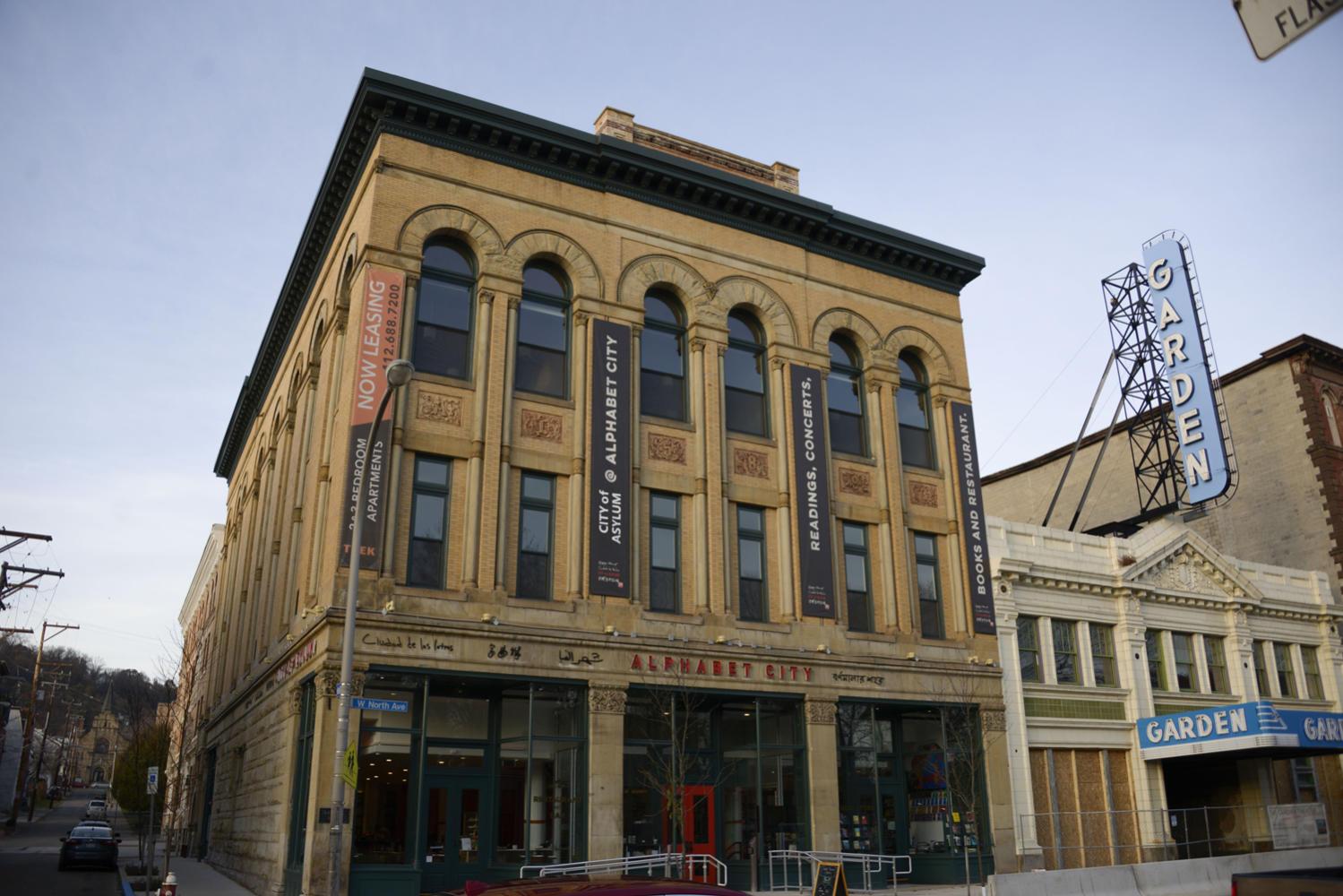An asylum for artists: students intern at a sanctuary for exiled writers


The City of Asylum @ Alphabet City, located on North Avenue in the North Side, provides a temporary home for writers who are exiled from their native countries. (Photo by Wenhao Wu | Assistant Visual Editor)
Rebecca Martin stares in awe from behind the “Banned Books” shelf in her volunteer T-shirt inscribed with the words “City of Asylum” written out in four different languages.
She yields to occasional orders from Leslie, the supervisor for the night, greeting and registering guests as she tries to muster up the courage to talk to iconic punk poet Eileen Myles, who is reading from her new book, “Afterglow (a dog memoir).”
Martin is an intern at the City of Asylum @ Alphabet City, a nonprofit organization and bookstore located in Pittsburgh’s North Side. Founded by Diane Samuels and Henry Reese, it provides sanctuary for literary writers in exile from their home countries.
The writers — previously from countries such as China, Bangladesh, Iran and Syria — are typically exiled because of controversial writing and are granted housing for up to four years if their application is accepted. The organization provides financial and medical support for artists and their families for two years as they adjust and stabilize their lives in the United States. Pittsburgh is one of three cities of asylum, and is the only one that is a grassroots organization rather than an institutionally sponsored program. The other two cities are Ithaca, New York, and Las Vegas.
The organization moved from its hand-painted, intimate space on Sampsonia Way to a revitalized venue on North Avenue to expand its reach and open up a bookstore and restaurant. Currently, the organization hosts two writers in exile but focuses largely on organizing events for artists to share their writing, films or music. Registered event attendees range from all ages and backgrounds, and walk-ins are welcome to go and listen for a song or two and relax with a glass of wine from the restaurant bar.
While the organization has already provided six established writers with a place of refuge to freely express their art for the past 14 years, it is increasingly welcoming uncertain Pitt students to its creative space as well.
The City of Asylum offers internships for college students who are looking for an escape from their work-study programs or other local jobs. The interns, most of whom come from the English and arts departments, work 15 to 20 hours per week for no pay and usually, despite the organization’s offer to provide it, no academic credit. The program also offers new internships for the fall, spring and summer terms and entails administrative work, event planning and event management.
Natasha Neira, the administrative assistant at City of Asylum, helps interview intern applicants and said the process is designed to identify students with the most interest and passion in their work.
“We really don’t specify by major at all — it’s more just desire, because there are many facets to any office,” she said. “Even if you’re not necessarily a writing major or in poetry or whatever, our work here crosses a lot of different things.”
After reviewing resumés and interviewing students, who typically hear about the opportunity through Pitt’s English department and email correspondence, the team selects five to six interns every term.
Two current Pitt interns, senior English writing and gender studies major Martin and senior linguistics and English literature major Connor McCoy, both applied for the position at the start of the 2017 academic year, went through an interview process in the office and were notified of their selections.
The internship is a bit of a step outside of their usual comfort zones, as the seniors have grown accustomed to working solely for money.
“This is my first unpaid internship. I’m suffering for my art, so to speak. But it’s good, I really like it,” Martin said.
Martin doesn’t know what she wants to do after graduation but hopes to keep working on and promoting her poetry wherever she ends up. She said she saw the internship mainly as an opportunity to get her foot in the door of Pittsburgh’s growing arts community.
“I wanted to think more about what I’m going to do after I graduate, and what kinds of people in Pittsburgh I’m interested in interacting with and working with in a personal way,” Martin said. “This is good to see what’s even out there for me to do.”
Attending events with some of her favorite poets has been a highlight, according to Martin. She tries her best to schedule her work days to align with the appearances of some of her inspirations, such as Myles.
“I was freaking out,” she said. “I talked to Eileen briefly — I don’t know, sometimes I’m still starstruck,” she said.
McCoy also has an academic interest in the work City of Asylum does. He currently works at the University Art Gallery in Frick and said he enjoys learning about different languages and cultures.
“I like doing things that help other underprivileged people,” McCoy said. “I like talking to people from other cultures and other countries.”
He even noted how some of the translation work he has helped the organization with for artists or films at certain events correlates with his studies in classes, such as Irish Gaelic, and he often tries to identify the differences between languages.
“Sometimes I’m wondering as I’m reading the subtitles if what they’re saying gets across,” he said. “I’m trying to hear the rhymes as they happen in their language.”
McCoy said he saw the real impact of his work with the organization one night when the staff passed out signs with endangered writers’ names on them and their current status in their countries.
“Around halfway through the event they ask the crowd to hold up these placards with all different names and they take a photo and post it on Facebook,” he said. “A lot of people see that and that’s kind of a show of solidarity.”
Junior history of art and architecture major Emma Vescio interned at City of Asylum during the last spring semester, and while her experience did help her learn that programming and event planning were not where she wanted to take her career, it did shape her plans.
“[The experience] told me that I would want to work in a nonprofit. Even though it’s a lot of hard work, I think it pays off really well,” Vescio said.
While City of Asylum looks toward their interns first whenever a new full-time position opens up, interns’ plans for what comes next after their work in Alphabet City can often look as puzzling as alphabet soup. Their interests, however, seem to find logical order.
“I want to keep doing stuff like this, whether it’s at a nonprofit or not,” McCoy said. “Just being an American who wants other people to come in, and showing hospitality.”
Recent Posts
Opinion | Elon Musk has succumbed to the anti-woke mind virus
The idea of a political mind virus is intriguing, and if we chart his personal…
Editorial | The GPT-4 Studio Ghibli trend again reveals a horrible misappreciation for human-made art
Ignoring the potential violations and oversteps of copyright law, the ability to immediately generate images…
Review | ‘Opus’ feels like a rush job
Mark Anthony Green's “Opus” displays a lackluster plot despite brilliant performances. “Opus” leaves a confusing…
‘The new normal’: Pitt athletes reflect on changing landscape of women’s sports
Thanks to Title IX, college women athletes across the country have opportunities most women 60…
Column | This Pirates team doesn’t feel new
Look, baseball is a long season. If there is any sport that you can’t overreact…
Water outage causes ‘panic’ amongst students
A water main break on Tuesday night caused stress and confusion for students living in…

